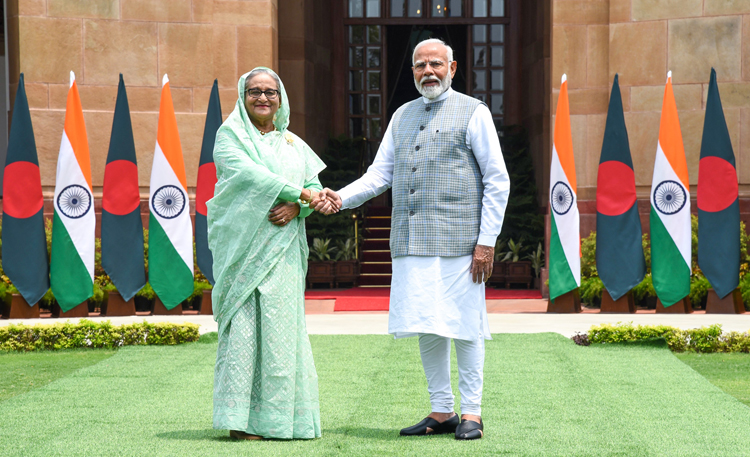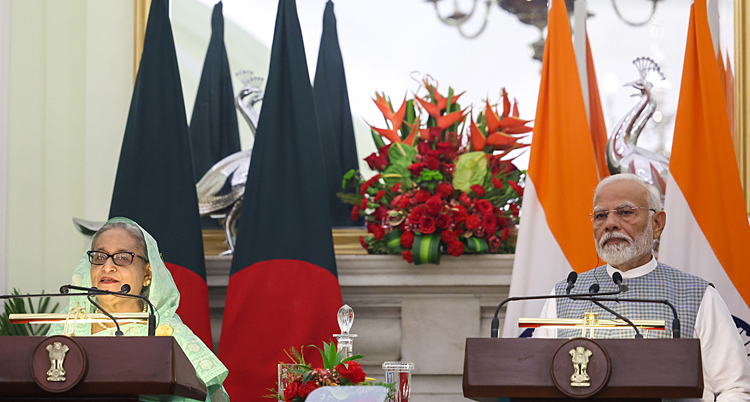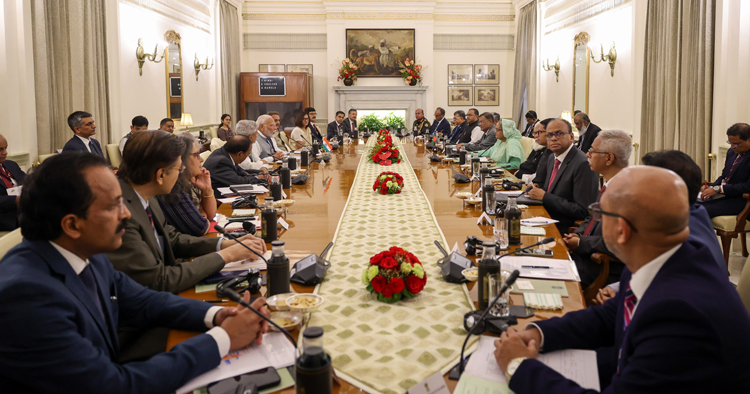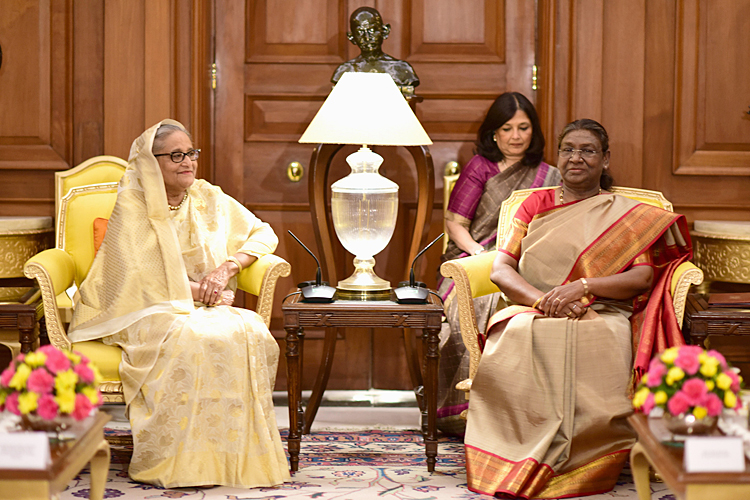INDIAN ARMED FORCES CHIEFS ON OUR RELENTLESS AND FOCUSED PUBLISHING EFFORTS

The insightful articles, inspiring narrations and analytical perspectives presented by the Editorial Team, establish an alluring connect with the reader. My compliments and best wishes to SP Guide Publications.

"Over the past 60 years, the growth of SP Guide Publications has mirrored the rising stature of Indian Navy. Its well-researched and informative magazines on Defence and Aerospace sector have served to shape an educated opinion of our military personnel, policy makers and the public alike. I wish SP's Publication team continued success, fair winds and following seas in all future endeavour!"

Since, its inception in 1964, SP Guide Publications has consistently demonstrated commitment to high-quality journalism in the aerospace and defence sectors, earning a well-deserved reputation as Asia's largest media house in this domain. I wish SP Guide Publications continued success in its pursuit of excellence.
State visit of Bangladesh Prime Minister
The highlight of Sheikh Hasina's visit was holding discussions with Narendra Modi and signing seven memorandums of understanding (MoUs) and renewing three previous agreements to solidify the bilateral relationship further.
 |
The Author is Former Director General of Information Systems and A Special Forces Veteran, Indian Army |

Fourth-time Prime Minister Sheikh Hasina of Bangladesh made a state visit to India on June 21-22, 2024 at the invitation of Prime Minister Narendra Modi. Earlier on June 9, she attended the swearing in ceremony of the new NDA Government led by third-time Prime Minister Modi at Rashtrapati Bhawan. Significantly, her state visit to India precedes her visit to China scheduled in second week July 2024. China is trying to draw Bangladesh into China's strategic sphere (military supplies, establishing submarine base, $5 billion soft-loan and more), as was enumerated in these columns recently (https://www.sps-aviation.com/experts-speak/?id=852&h=Dhaka-in-Dragon-Shadow).
Key highlights of the MoUs signed include agreements in the fields of Blue Economy and Maritime Cooperation in the Bay of Bengal and Indian Ocean Region, and collaborations in digital and green partnerships for sustainable development.
During her visit, apart from holding bilateral consultations with the Prime Minister Modi, Bangladesh Prime Minister Sheikh Hasina called on President Droupadi Murmu and Vice President Jagdeep Dhankhar. The highlight of Sheikh Hasina's visit was holding discussions with Narendra Modi and signing of seven memorandum of understanding (MoUs) and renewing three previous agreements to solidify the bilateral relationship further in presence of the two leaders.


Key highlights of the MoUs signed include agreements in the fields of Blue Economy and Maritime Cooperation in the Bay of Bengal and Indian Ocean Region, joint research on oceanography between Bangladesh Oceanographic Research Institute and India's Council of Scientific and Industrial Research, and collaborations in digital and green partnerships for sustainable development. Additionally, agreements were reached on enhancing rail connectivity, initiating joint projects in space technology, and fostering military education cooperation. Other MoUs that were renewed were in fisheries, disaster management, and health sectors.
External Affairs Minister S. Jaishankar posted on X: "The agreements signed today show the breadth of our bonds. From seas to space, digital, green and health, military, rail, and disaster, our two countries are collaborating across all avenues of human endeavour."
External Affairs Minister S. Jaishankar posted on X: "The agreements signed today show the breadth of our bonds. From seas to space, digital, green and health, military, rail, and disaster, our two countries are collaborating across all avenues of human endeavour. Confident that under PM @narendramodi and PM Sheikh Hasina's leadership will keep growing from strength to strength. Today's State visit of Bangladesh Prime Minister Sheikh Hasina reflects the depth of the Bharat-Bangladesh Maitri. That PM Hasina is the first State guest in our new term shows the importance we attach to the relationship. As PM @narendramodi said, Bangladesh lies at the intersection of our Neighbourhood First, Act East, SAGAR, and Indo-Pacific policies. Being truly good neighbours, our ties are consolidating traditional areas and covering new ground."

Finally, India needs to increase its focus on India-Bangladesh relations, taking into account Chinese plans for the region. Aside from improving economic and military-to-military cooperation and participation in projects like BIMSTEC and IORA (Indian Ocean Rim Association) for mutual benefit, India should also integrate with Bangladesh's 'Vision 2041' and 'Smart Bangladesh Vision 2041' least China takes advantage of these, as also consider establishing a 2+2 Dialogue with Bangladesh.
In the press statement after talks with Prime Minister Modi in New Delhi, Sheikh Hasina said: "India is our major neighbour, trusted friend and regional partner. Bangladesh greatly values its relations with India, which were born during our war of liberation in 1971."
For Bangladesh, geography and close economic links forged over decades necessitate maintenance of close relations with India but requirements of mega investments and speedy implementation of projects also necessitates good relations with China. Sheikh Hasina, therefore, has to manage both India and China through deft diplomacy. Speaking to the Dhaka Daily, Bangladesh Foreign Secretary Masud Bin Momen said: "The relationship between Bangladesh and India has a historical context, geographical location. I do not want to compare any other country in terms of relations with India."

In the press statement after talks with Prime Minister Modi in New Delhi, Sheikh Hasina said: "India is our major neighbour, trusted friend and regional partner. Bangladesh greatly values its relations with India, which were born during our war of liberation in 1971." India played a major role not only in the Liberation of Bangladesh but also helped Sheikh Hasina's fourth consecutive win in January 2024 by impressing upon the US that continuation of the Sheikh Hasina-led Awami League would be good for regional stability.
Most significant was Modi's announcement that India-Bangladesh will begin technical-level talks for renewing the 1996 Ganga Waters Treaty and an Indian technical team will soon visit Bangladesh for conservation and management of the Teesta River.
Most significant was Modi's announcement that India-Bangladesh will begin technical-level talks for renewing the 1996 Ganga Waters Treaty and an Indian technical team will soon visit Bangladesh for conservation and management of the Teesta River. An agreement for water sharing has been a long-standing demand of Bangladesh, which has remained unaddressed. China, adept at weaponising water, suggested in 2016 the Teesta River Management project, costing $1 billion, to help Bangladesh overcome water problems because of barrages on the river in India. In May 2023, India offered to fund and participate in the project but will China agree? Also, at the joint press conference Modi announced Bangladesh's decision to join the Indo-Pacific Oceans Initiative (IPOI). This again China may not like.

China has been Bangladesh's largest trading partner for 13 years, with a bilateral goods trade reaching $24 billion in 2023 and China's FDI stock in Bangladesh at $3.2 billion by 2023, making China the second-largest investor in Bangladesh. In contrast, India-Bangladesh bilateral trade in 2022-23 was $15.9 billion. India has invested over $8 billion in Bangladesh. China's $5 billion soft-loan to Bangladesh, which will likely be signed during Sheikh Hasina's forthcoming visit to China next month, is viewed as a debt-trap but Bangladesh is facing serious economic problems with an alarming decline in foreign currency reserves.
With Bangladesh working on a plan to modernise its military and China being a major supplier of key platforms and equipment to Dhaka, India is stepping up to enhance its bilateral defence ties with Bangladesh. Foreign Secretary Vinay Kwatra said, "The two sides in today's discussion also discussed how the entire spectrum of defence cooperation between India and Bangladesh can be strengthened whether that relates to the modernisation of the Bangladesh Army, that also includes capacity building or training facilities exercises between the two countries."
Finally, India must maintain focus and keep upgrading bilateral relations with Bangladesh, taking into account Chinese plans for the region. Aside from improving economic and military-to-military cooperation and participation in projects like BIMSTEC and IORA (Indian Ocean Rim Association) for mutual benefit, India should also integrate with Bangladesh's 'Vision 2041' and 'Smart Bangladesh Vision 2041' least China takes advantage of these, as also consider establishing a 2+2 dialogue with Bangladesh.





